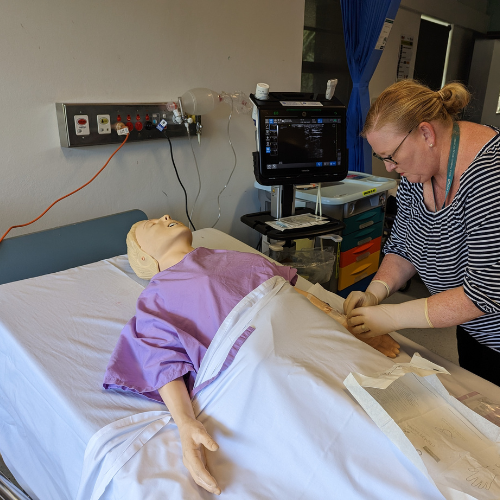Projects
Reducing interruptions to intravenous antibiotic therapy: Do longer peripheral intravenous catheters optimise delivery?
2022 RBWH Foundation and RBWH Project Grant
Share this project
Project description
Intravenous (IV) antibiotic delivery is a common reason for catheter insertion at RBWH. This study looked at whether using a longer tube (catheter between 4.5 to 8cm in length) in the arm is better for giving antibiotics compared to a shorter one (less than 4cm in length).
Why this work is needed
Short catheters have been vastly used at RBWH. However, up to half of these stop working before the IV antibiotic treatment is completed, leading to serious consequences such as ineffective treatment of infection, the development of antibiotic resistant organisms (when bacteria stop responding to the treatment and keep reproducing regardless) and increased length of hospital stay.
One-hundred and ninety-four patients were included in the study. The goal was to ensure patients received the right device efficiently, avoiding multiple painful attempts. This is especially important for patients needing antibiotics.
Conjoint Research Fellow Dr Amanda Corley’s research aimed to minimise patient harm by emphasizing the expertise of vascular access specialists.
Outcomes
Dr Corley and her team found no significant difference between long and short catheters in terms of failure or how long they lasted.
This suggests that catheter length doesn't guarantee better antibiotic delivery, challenging conventional thinking, and informs that other than catheter length is important when deciding which is best for a patient.
Patients were equally satisfied with both long and short catheters.
Based on these results funded by this RBWH Foundation grant, Dr Corley was able to guarantee further funds to commence a randomised controlled trial of expert vascular access specialists deciding and inserting catheters the first time, to compare that to a ‘generalist’ approach.
The goal is to develop recommendations emphasising the need for expert vascular access specialists, especially for patients with challenging veins, to minimize harm and improve overall patient satisfaction.
"Thank you to the RBWH Foundation for funding my research, which aimed to optimise antimicrobial delivery to our hospitalised patients.
We could not have completed this study without the generous contributions of the RBWH Foundation donors and we are very grateful that the Foundation is there to support our research exploring ways to optimising intravenous drug delivery and improve the care delivered to our patients."
Dr Amanda Corley, RBWH Clinician Researcher
Meet the Project Leader

Dr Amanda Corley
Conjoint Research Fellow (Clinician Researcher)
RBWH and Griffith University
Dr Amanda Corley
Amanda, a Registered Nurse with over 20 years’ experience in intensive care, completed her PhD in 2022. Her research priorities are grounded in clinical practice because, as a hospital-based researcher, she focuses on research outcomes which can be readily translated into the clinical area to improve patient safety.
Amanda’s research focuses particularly on intravascular devices, ensuring that the care that patients with intravascular devices receive is safe and evidence-based. Her research has influenced local, national and international clinical practice guidelines.





